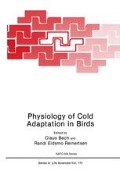Abstract
Birds living in the cold face energetic challenges from low ambient temperatures (Ta) as well as from food scarcity which often accompanies cold in nature. Birds react to low Ta with complex thermoregulatory and metabolic adjustments, and they also alter their foraging and feeding behavior rather dramatically when the availability of food becomes limited. In reaching a full understanding of adaptation to cold, it will be necessary to take into account the ways birds adapt to food scarcity as well as their thermal/metabolic adaptations to low Ta. This is a particularly interesting problem because of the interplay between thermoregulation and feeding. For example, when feeding strategies fail to produce sufficent food to maintain energy reserves, some birds reduce energy costs by lowering their body temperature (Tb). Also, exposure to cold not only activates the bird’s thermoregulatory defenses, but alters feeding strategies in a way that results in increased food intake if sufficient food is available in the environment. Furthermore, food intake has short term thermogenic consequences which can be significant in certain circumstances.
Access this chapter
Tax calculation will be finalised at checkout
Purchases are for personal use only
Preview
Unable to display preview. Download preview PDF.
References
Collier, G. H., 1983, Life in a closed economy: The ecology of learning and motivation, in: “Advances in Analysis of Behavior, Vol. 3,” M. D. Zeiler and P. Harzern, eds., Wiley: New York.
Collier, G. H., and Rovee-Collier, C. K., 1981, A comparative analysis of optimal foraging behavior: Laboratory simulations, in: “Foraging Behavior: Ecological, Ethological and Psychological Approaches,” A.C. Kamil and T. D. Sargent, eds., Garland Press: New York.
Henderson, D., 1988, “Feeding in the Cold: Pigeons (Columba livia) in a Closed Economy,” Masters thesis. Florida State University, Tallahassee, Florida.
Hudson, J. W., 1978, Shallow daily torpor: A thermoregulatory adaptation. in: “Strategies in Cold: Natural Torpidity and Thermogenesis,” L. C.H. Wang and J. W. Hudson, eds., Academic Press: New York.
Hursh, S. R., 1980, Economic concepts for the analysis of behavior, J Exp Anal Behav. 37: 219.
Hursh, S. R., 1984, Behavioral economics, J Exp Anal Behav., 42: 435.
Kendeigh, S. C., Kontogiannis, J. E., Mazac, A., and Roth, R. R., 1969, Environmental regulation of food intake by birds, Comp Biochem and Physiol. 31: 941.
Kraly, F. S., and Blass, E. M., 1976, Mechanisms for enhanced feeding in the cold in rats, J. Comp & Physiol Psychol. 90: 714.
McFarland, D., and Budgell, P., 1970, The thermoregulatory role of feather movements in the Barbary Dove (Streptopelia risoria), Phvsiol Behav., 5: 763.
Phillips, D. L., 1989, “Thermal Effects of Feeding during Chronic Food Scarcity in the Pigeon (Columba livia),” Masters thesis. Florida State University, Tallahassee, Florida.
Rashotte, M. E., and Henderson, D., in press, Coping with rising food costs in a closed economy: Feeding behavior and nocturnal hypothermia in pigeons (Columba livia). J Exp Anal Behav.
Rashotte, M. E., and O’Connell, J. M., 1986, Pigeons’ reactivity to food and to Pavlovian signals for food in a closed economy: Effects of feeding time and signal reliability. J. Exp Psychol (Animal Behav Proc)., 12: 235.
Rashotte, M. E., Rautenberg, W., Henderson, D. and Ostheim, J., 1986, “Thermal, metabolic and feeding reactions of pigeons when food is scarce,” Paper read at the 27th annual meeting of the Psychonomic Society, New Orleans, Louisiana.
Savory, C. J., 1986, Influence of ambient temperature on feeding activity parameters and digestive function in domestic fowls, Physiol Behav., 38: 353.
Steen, J., 1957, Food intake and oxygen consumption in pigeons at low temperatures, Acta Phvsiol Scand., 39: 22.
Zeigler, H. P., Green, H. L. and Lehrer, R., 1971, Patterns of feeding behavior in the pigeon, J Comp & Phvsiol Psychol., 76: 468.
Author information
Authors and Affiliations
Editor information
Editors and Affiliations
Rights and permissions
Copyright information
© 1989 Springer Science+Business Media New York
About this chapter
Cite this chapter
Rashotte, M.E., Henderson, D., Phillips, D.L. (1989). Thermal and Feeding Reactions of Pigeons during Food Scarcity and Cold. In: Bech, C., Reinertsen, R.E. (eds) Physiology of Cold Adaptation in Birds. NATO ASI Series, vol 173. Springer, Boston, MA. https://doi.org/10.1007/978-1-4757-0031-2_27
Download citation
DOI: https://doi.org/10.1007/978-1-4757-0031-2_27
Publisher Name: Springer, Boston, MA
Print ISBN: 978-1-4757-0033-6
Online ISBN: 978-1-4757-0031-2
eBook Packages: Springer Book Archive

